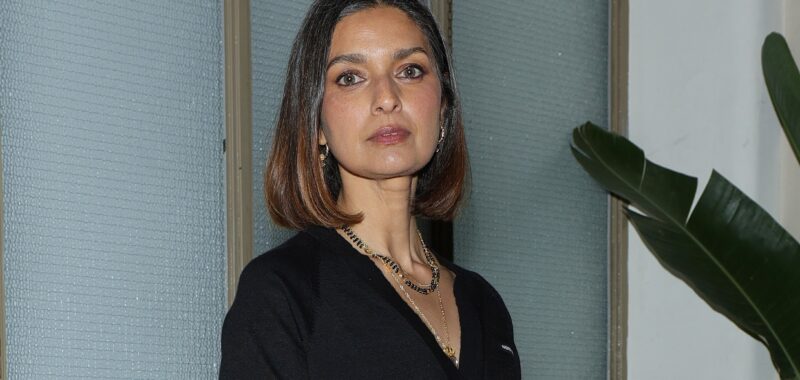Pulitzer Prize-winning author Jhumpa Lahiri has declined the Noguchi Museum’s 2024 Isamu Noguchi Award in a gesture of support for former workers at the institution who were fired for wearing keffiyehs, headscarves popular in many Arab countries and symbolic of Palestinian heritage and solidarity.
“Jhumpa Lahiri has chosen to withdraw her acceptance of the 2024 Isamu Noguchi Award in response to our updated dress code policy, which removes political statements from the workplace,” a Noguchi Museum spokesperson confirmed in a statement to Hyperallergic. “We respect her perspective and understand that this policy may or may not align with everyone’s views.”
The Queens institution has come under mounting pressure from workers and community members in the last month after announcing a new policy that bans staff from wearing keffiyehs. Billed as a dress-code update that prohibits “political” statements to avoid “unintentional alienation of our diverse visitorship,” the policy was immediately repudiated by employees, over 50 of whom signed an internal petition calling for its reversal. The petition text, reviewed by Hyperallergic, cited the keffiyeh’s significance as a cultural garment and warned that the policy would “decrease the museum’s credibility and tarnish its public image” if it became public.
Three gallery attendants who said they would not comply with the rule, Trasonia Abbott, Natalie Cappellini, and Q. Chen, were terminated on Wednesday, September 4, as first reported by Hyperallergic. A fourth worker, the museum’s director of Visitor Services, was previously let go amid the policy fallout.
That weekend, dozens of supporters rallied outside the institution in protest. They wore keffiyehs and held signs referencing Isamu Noguchi’s legacy as a socially engaged artist, and called for leadership Director Amy Hau, Deputy Director Jennifer Lorch, and board co-chairs Spencer Bailey and Susan Kessler to be held accountable.

Lahiri’s refusal of the award is the latest development in a story that has catapulted a largely beloved local museum to the headlines as institutions around the country face accusations of silencing expressions of Palestinian solidarity. Recently in New York, a program manager at the 92Y lost her job after she refused to remove a watermelon sticker and take down a poster reading “Ceasefire Now, End the Genocide, Free Palestine.”
The writer’s decision also coincides with the unanimous passage of a United States Senate resolution honoring Wadee AlFayoumi, a six-year-old Palestinian-American boy who was stabbed to death in a brutal hate crime in Plainfield, Illinois, last October. The statement acknowledges the keffiyeh as a Palestinian cultural symbol and marks the first time Congress has recognized Palestinian Americans in a resolution, according to the Arab American Anti-Discrimination Committee.
The Isamu Noguchi Award, conferred annually since 2014, honors individuals who show “the highest level of artistic integrity.” Previous awardees include sculptor Thaddeus Mosley, novelist Hanya Yanagihara, and artist Theaster Gates. This year, Lahiri and Korean-born artist Lee Ufan were selected to receive the award at the museum’s benefit gala on October 29.
Lee’s studio and gallery have not yet responded to a request for comment. He is expected to accept the prize, the museum’s spokesperson said.
Lahiri, a British-born American writer, is known for works that examine the South Asian immigrant experience in the United States. She received the Pulitzer Prize for Fiction for her debut collection of short stories, Interpreter of Maladies (1999), and was a finalist for the Booker Prize and the National Book Award for Fiction for her second novel, The Lowland (2013). In May, the author signed an open letter addressed to university presidents in support of nationwide campus protests in solidarity with the Palestinian cause.
Lahiri has not yet responded to Hyperallergic’s inquiry. Via her agent, the author declined to comment to the New York Times, which first reported on her decision.
“I’m glad that there are people of principle in the world,” Abbott, one of the three terminated gallery attendants, told Hyperallergic, expressing gratitude for Lahiri’s withdrawal. “I hope Lee Ufan follows suit and rejects the award as well.”
The Noguchi Museum, Abbott noted, has previously made public statements against systemic racism, white supremacy, and violence toward people of color under the banner of its namesake artist’s commitment to freedom and equality.
Now, a message from Director Hau recently posted on the institution’s website reads: “The Museum was not established as an advocacy or social justice organization, and because Noguchi passed away in 1988, we cannot speak on his behalf or claim to represent his views on today’s complex global issues.”
Abbott views this as a bias against Palestinian and Arab people amid Israel’s intensifying military escalation in Lebanon and Gaza’s rising death toll.
“Before Amy Hau and the board decided to rewrite history, they had no problem capitalizing on Noguchi’s more activist leanings and applying them to the current world,” Abbott said. “To attempt to take a neutral stance in the face of this is disgusting, especially given Noguchi’s anti-war sentiments while he was still alive.”

